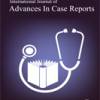Volume 11, Issue 1, 2024

Mcmed International
International Journal of Advances In Case Reports
Issn
XXX-XXXX (Print),
2349 - 8005 (Online)
Frequency
bi-annual
Email
editorijacr@mcmed.us
Journal Home page
http://mcmed.us/about/ijacr
Recommend to
Purchase














